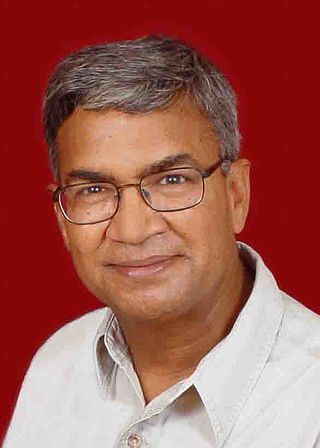Related Research Articles
Epistemology is the branch of philosophy concerned with knowledge. Epistemologists study the nature, origin, and scope of knowledge, epistemic justification, the rationality of belief, and various related issues. Debates in (contemporary) epistemology are generally clustered around four core areas:
- The philosophical analysis of the nature of knowledge and the conditions required for a belief to constitute knowledge, such as truth and justification
- Potential sources of knowledge and justified belief, such as perception, reason, memory, and testimony
- The structure of a body of knowledge or justified belief, including whether all justified beliefs must be derived from justified foundational beliefs or whether justification requires only a coherent set of beliefs
- Philosophical skepticism, which questions the possibility of knowledge, and related problems, such as whether skepticism poses a threat to our ordinary knowledge claims and whether it is possible to refute skeptical arguments
Action theory is an area in philosophy concerned with theories about the processes causing willful human bodily movements of a more or less complex kind. This area of thought involves epistemology, ethics, metaphysics, jurisprudence, and philosophy of mind, and has attracted the strong interest of philosophers ever since Aristotle's Nicomachean Ethics. With the advent of psychology and later neuroscience, many theories of action are now subject to empirical testing.

Donald Herbert Davidson was an American philosopher. He served as Slusser Professor of Philosophy at the University of California, Berkeley, from 1981 to 2003 after having also held teaching appointments at Stanford University, Rockefeller University, Princeton University, and the University of Chicago. Davidson was known for his charismatic personality and the depth and difficulty of his thought. His work exerted considerable influence in many areas of philosophy from the 1960s onward, particularly in philosophy of mind, philosophy of language, and action theory. While Davidson was an analytic philosopher, and most of his influence lies in that tradition, his work has attracted attention in continental philosophy as well, particularly in literary theory and related areas.

Robert Boyce Brandom is an American philosopher who teaches at the University of Pittsburgh. He works primarily in philosophy of language, philosophy of mind and philosophical logic, and his academic output manifests both systematic and historical interests in these topics. His work has presented "arguably the first fully systematic and technically rigorous attempt to explain the meaning of linguistic items in terms of their socially norm-governed use, thereby also giving a non-representationalist account of the intentionality of thought and the rationality of action as well."
In logic, the semantics of logic or formal semantics is the study of the semantics, or interpretations, of formal and natural languages usually trying to capture the pre-theoretic notion of entailment.
Truth-conditional semantics is an approach to semantics of natural language that sees meaning as being the same as, or reducible to, their truth conditions. This approach to semantics is principally associated with Donald Davidson, and attempts to carry out for the semantics of natural language what Tarski's semantic theory of truth achieves for the semantics of logic.
Contextualism, also known as epistemic contextualism, is a family of views in philosophy which emphasize the context in which an action, utterance, or expression occurs. Proponents of contextualism argue that, in some important respect, the action, utterance, or expression can only be understood relative to that context. Contextualist views hold that philosophically controversial concepts, such as "meaning P", "knowing that P", "having a reason to A", and possibly even "being true" or "being right" only have meaning relative to a specified context. Other philosophers contend that context-dependence leads to complete relativism.
Raimo Heikki Tuomela ) was a Finnish philosopher.

Kaarlo Jaakko Juhani Hintikka was a Finnish philosopher and logician. Hintikka is regarded as the founder of formal epistemic logic and of game semantics for logic.
Radical interpretation is interpretation of a speaker, including attributing beliefs and desires to them and meanings to their words, from scratch—that is, without relying on translators, dictionaries, or specific prior knowledge of their mental states. The term was introduced by American philosopher Donald Davidson (1973) and is meant to suggest important similarity to W. V. O. Quine's term radical translation, which occurs in his work on the indeterminacy of translation. Radical translation is translation of a speaker's language, without prior knowledge, by observing the speaker's use of the language in context.

Stephen Roy Albert Neale is a British philosopher and specialist in the philosophy of language who has written extensively about meaning, information, interpretation, and communication, and more generally about issues at the intersection of philosophy and linguistics. Neale is a Distinguished Professor of Philosophy and Linguistics and holder of the John H. Kornblith Family Chair in the Philosophy of Science and Values at the Graduate Center, City University of New York (CUNY).
In analytic philosophy, philosophy of language investigates the nature of language and the relations between language, language users, and the world. Investigations may include inquiry into the nature of meaning, intentionality, reference, the constitution of sentences, concepts, learning, and thought.
Ernest or Ernie Lepore is an American philosopher and cognitive scientist and a professor of philosophy at Rutgers University.
Nijaz Ibrulj is a Bosnian philosopher and a professor at the University of Sarajevo's Department of Philosophy and Sociology. He lectures on logic, analytic philosophy, methodology of social sciences, theory of knowledge, and cognitive science. His interests also extend to the field of social ontology. Ibrulj was awarded a Fulbright Visiting Scholarship during the 2000-2001 academic years to visit the University of California, Berkeley. His application was sponsored by John Searle and Donald Davidson.
Ian Rumfitt is a British philosopher specializing in the philosophy of language and philosophy of math, who is currently Senior Research Fellow at All Souls College, Oxford.
Formal semantics is the study of grammatical meaning in natural languages using formal tools from logic, mathematics and theoretical computer science. It is an interdisciplinary field, sometimes regarded as a subfield of both linguistics and philosophy of language. It provides accounts of what linguistic expressions mean and how their meanings are composed from the meanings of their parts. The enterprise of formal semantics can be thought of as that of reverse-engineering the semantic components of natural languages' grammars.
Herman Wright Cappelen is a Norwegian philosopher. He is currently the Chair Professor of Philosophy at the University of Hong Kong.

In the philosophy of mind, collective intentionality characterizes the intentionality that occurs when two or more individuals undertake a task together. Examples include two individuals carrying a heavy table up a flight of stairs or dancing a tango.

Anil K. Gupta is an Indian-American philosopher who works primarily in logic, epistemology, philosophy of language, and metaphysics. Gupta is the Alan Ross Anderson Distinguished Professor of Philosophy at the University of Pittsburgh. He is also a Fellow of the American Academy of Arts and Sciences. His most recent book, Conscious Experience: A Logical Inquiry, was published by Harvard University Press in 2019.

Friederike Moltmann is a linguist and philosopher. She has done pioneering work at the intersection of philosophy and linguistics, especially on the interface between metaphysics and natural language semantics, but also on the interface between philosophy of mind and mathematics. She is an important proponent of natural language ontology. She is currently Research Director at the French National Centre for Scientific Research (CNRS) in Paris.
References
- ↑ "Ludwig, Kirk 1959-". WorldCat Identities.
- 1 2 "Ludwig IU Faculty Bio".
- ↑ "Simon Evnine review of Donald Davidson: Meaning, Truth, Language and Reality" (PDF).
- ↑ "Gilbert Harman's review of Donald Davidson's Truth-Theoretic Semantics" (PDF).
- ↑ Tuomela, Raimo (31 May 2017). "Raimo Tuomela review of From Individual to Plural Agency".
- ↑ Bratman, Michael E. (August 2018). "From Plural to Institutional Agency: Collective Action II (Review)". Notre Dame Philosophical Reviews.
- ↑ "Kirk Ludwig Google Scholar Profile".
- ↑ "Kirk Ludwig Online CV".